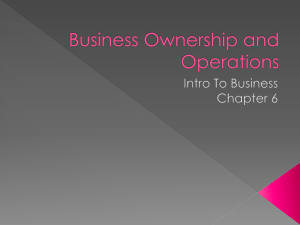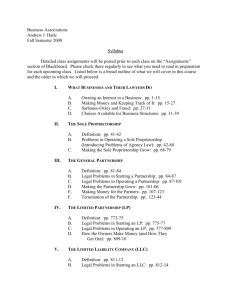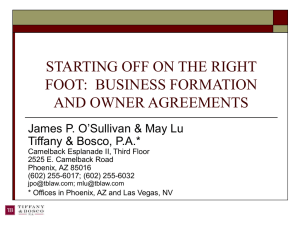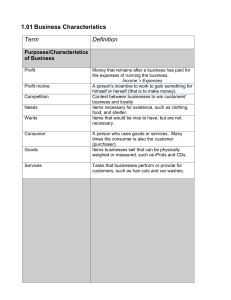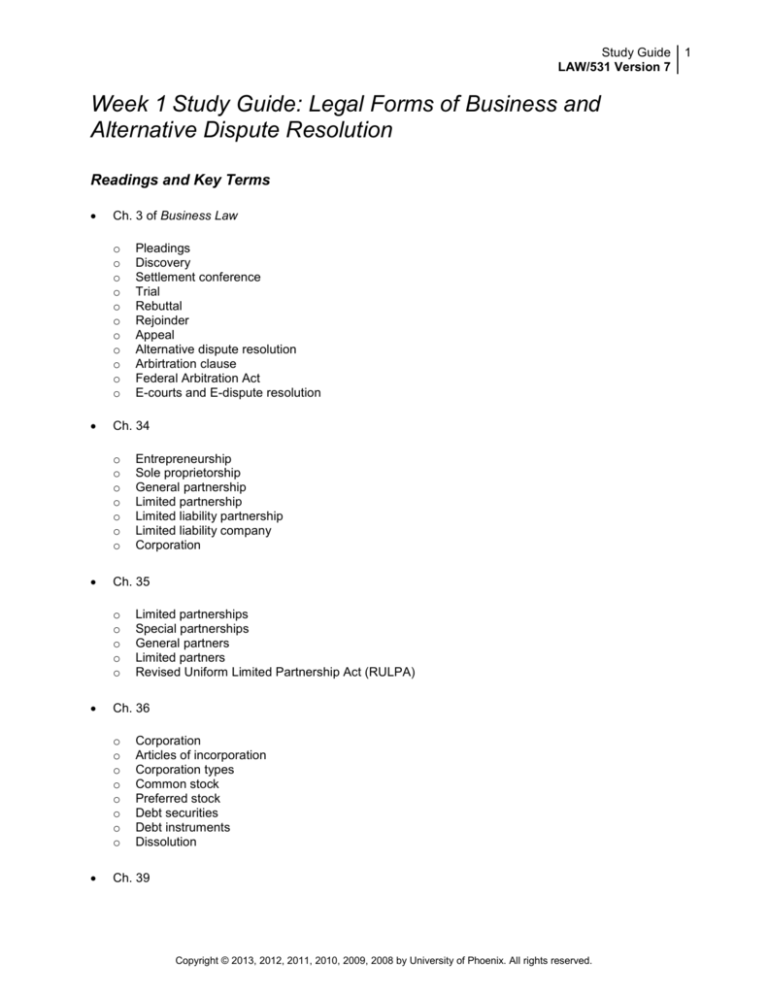
Study Guide
LAW/531 Version 7
Week 1 Study Guide: Legal Forms of Business and
Alternative Dispute Resolution
Readings and Key Terms
Ch. 3 of Business Law
o
o
o
o
o
o
o
o
o
o
o
Ch. 34
o
o
o
o
o
o
o
Limited partnerships
Special partnerships
General partners
Limited partners
Revised Uniform Limited Partnership Act (RULPA)
Ch. 36
o
o
o
o
o
o
o
o
Entrepreneurship
Sole proprietorship
General partnership
Limited partnership
Limited liability partnership
Limited liability company
Corporation
Ch. 35
o
o
o
o
o
Pleadings
Discovery
Settlement conference
Trial
Rebuttal
Rejoinder
Appeal
Alternative dispute resolution
Arbirtration clause
Federal Arbitration Act
E-courts and E-dispute resolution
Corporation
Articles of incorporation
Corporation types
Common stock
Preferred stock
Debt securities
Debt instruments
Dissolution
Ch. 39
Copyright © 2013, 2012, 2011, 2010, 2009, 2008 by University of Phoenix. All rights reserved.
1
Study Guide
LAW/531 Version 7
o
o
o
Limited liability company
Limited liability company dissolution
Limited liability partnership
Ch. 40
o
o
o
o
o
Franchise
Distributorship franchise
Processing plant franchise
Processing plant franchise
Area franchise
Content Overview
Judicial, alternative, and e-dispute resolution
o
Pretrial litigation process
Pleadings
o
o
o
o
Discovery
o
o
o
o
Party who sues files complaint
Based on complaint summons is issued
Answer is provided by person being sued
Cross-complaint can be filed by person sued in which case a reply must be sent by the
original party
Deposition is taken, which is oral testimony given prior to the trial
Interrogatories are written questions given by one party to the other
Production of documents are all of the documents that are secured by one party for use
at trial
Settlement conference: a hearing before trial to facilitate a settlement
Trial
o
o
o
o
o
o
o
Jury selection using process of voir dire
Opening statements given by each party
Plaintiff’s case: has the burden of proof to persuade trier of fact on the merits of the case
Defendant’s case: rebuts plaintiff’s case; offers affirmative defenses; or proves
allegations alleged in the cross complaint
Rebuttal occurs when evidence is put forth to disprove the defendants case
Rejoinder occurs when the defense offers evidence to refute the rebuttal
Closing arguments to convince jury of their case
Copyright © 2013, 2012, 2011, 2010, 2009, 2008 by University of Phoenix. All rights reserved.
2
Study Guide
LAW/531 Version 7
o
o
Appeal
o
o
o
o
o
o
Where contract contains arbirtration clause, the enforcement of clause is set forth in
Federal Arbitration Act
Impartial third party chosen to decide the dispute, which can be either binding or
nonbinding on the parties
Mediation: expert in disputed area helps parties to come to a settlement
Minitrial: lawyers present a shortened version of trial to an agreed to expert who hears
case; less expensive than trial and shows the case weaknesses and facilitates settlement
Fact-finding: parties hire someone to investigate the dispute
Judicial referee: parties agree to have court appoint a judicial referee to conduct a trial;
decisions can be appealed
E-courts allow for electronic filings of court documents
E-dispute resolution renders online dispute resolution in the form of arbitration
Small business, entrepreneurship, and general partnerships
o
Arbitration
E-courts and E-dispute resolution
o
o
Appellant is the appealing party
Appellee is the responding party to the appeal
Alternative dispute resolution
o
Instructions, deliberations and verdict take place after the closing arguments; the judge
reads the instructions to the jury and they consider all of the evidence (deliberate) and
render a decision
Judgment given by judge to the parties
Entrepreneurship occurs when an individual opens a business:
Forms for opening a business: sole proprietorship, general partnership, limited partnership,
limited liability partnership, limited liability company and corporation
Sole proprietorship: business owned by one person who is personally liable for debts of
business but takes all of the profits
General partnership: two or more owners form business and where partners are personally
liable for debts of partnership
Limited partnerships and special partnerships
o
Limited partnerships have general partners and limited partners
Copyright © 2013, 2012, 2011, 2010, 2009, 2008 by University of Phoenix. All rights reserved.
3
Study Guide
LAW/531 Version 7
General partners invest and manage the partnership and are personally liable.
Limited partners invest but do not manage the business and, therefore, are not personally
liable for the debts to the extent they exceed their contribution.
In most states, the formation, operation, and termination of limited partnerships are regulated
by the Revised Uniform Limited Partnership Act (RULPA), (Cheeseman, 2013, p. 582).
Corporate formation and financing
o
o
o
o
o
Corporation is a fictitious legal entity that is treated as a legal person and has the following:
Free transferability of shares
A perpetual existence
Centralized management
Limited liability of its shareholders to the extent of their capital contribution
The articles of incorporation define the purpose of a corporation
General purpose clause permits any activity permitted by law
Limited purpose sets forth activities corporation can engage in
Corporation types
Domestic in the state of formation
Foreign in states other than the one in which it is incorporated
Alien if incorporated in another country
Financing the corporation by stocks and debt securities
Common stock represents the residual value of the corporation
Preferred stock is security that has preferences and rights over common stock
Debt securities create a debtor–creditor relationship where money is borrowed by the
corporation
Debt instruments are debentures, bonds, and notes
Dissolution of the corporation
Voluntary dissolution can occur where no shares have been issued.
Administrative dissolution is ordered by the secretary of state for failure to follow
administrative procedures.
Limited liability companies and limited liability partnerships
o
Limited liability company (LLC): formed under the Uniform Limited Liability Company Act
Copyright © 2013, 2012, 2011, 2010, 2009, 2008 by University of Phoenix. All rights reserved.
4
Study Guide
LAW/531 Version 7
o
o
o
o
o
Formation of an LLC: articles of organization must contain name, address, duration and
management
Limited liability of members on debts and obligations to the extent of their capital contribution
Management of the LLC
Member-managed shares rights equally among members to manage company
Manager-managed LLC designates management in their articles of organization
Dissolution of LLC occurs when a member withdraws or where the operating agreement
eliminates a member’s ability to withdraw
Limited liability partnership is created where all partners are limited and is formed by filing articles
of limited liability partnership
Franchises and special forms of business
o
o
o
Franchise exists where the franchisor licenses the franchisee the trade name and other
intellectual property for use to operate the business
Types of franchises are the following:
Distributorship franchise
Processing plant franchise
Chain-style franchise
Area franchise
Termination of a franchise occurs by breach of the franchise agreement
Copyright © 2013, 2012, 2011, 2010, 2009, 2008 by University of Phoenix. All rights reserved.
5


